Staying hydrated and recovered is vital for optimal
performance and general health, whether you are an elite athlete, someone who likes to stay active, or a regular gym-goer.
The human body cannot survive without water, but if you sweat a lot or work out for more than an hour, you may need more than just water to stay hydrated. Sports drinks, which are specifically prepared beverages with carbs, electrolytes, and sometimes additional nutrients to help you perform better and recover faster, are a popular choice among athletes.
Sports drinks have become an important part of the diet of anyone who works out, but there are so many choices that it can be hard to pick the right one.
But how can you pick the best sports drink when there are so many to select from? Which sports drinks have the most advantages, and which have the most disadvantages, and why? How can you best utilize them to enhance your rehydration and recuperation?
In this article, we will answer these questions and more, as we review some of the best sports drinks of 2023, backed by
scientific research, athlete feedback and according to a
dietitian.
What are sports drinks and how do they work?
Sports drinks are liquids with carbohydrates (typically in the form of sugars), electrolytes (such as sodium, potassium, magnesium, and calcium), and — on occasion — additional ingredients (like caffeine, vitamins, antioxidants, amino acids, etc.) that are intended to provide hydration and energy for physical activity.
[caption id="" align="aligncenter" width="571"]
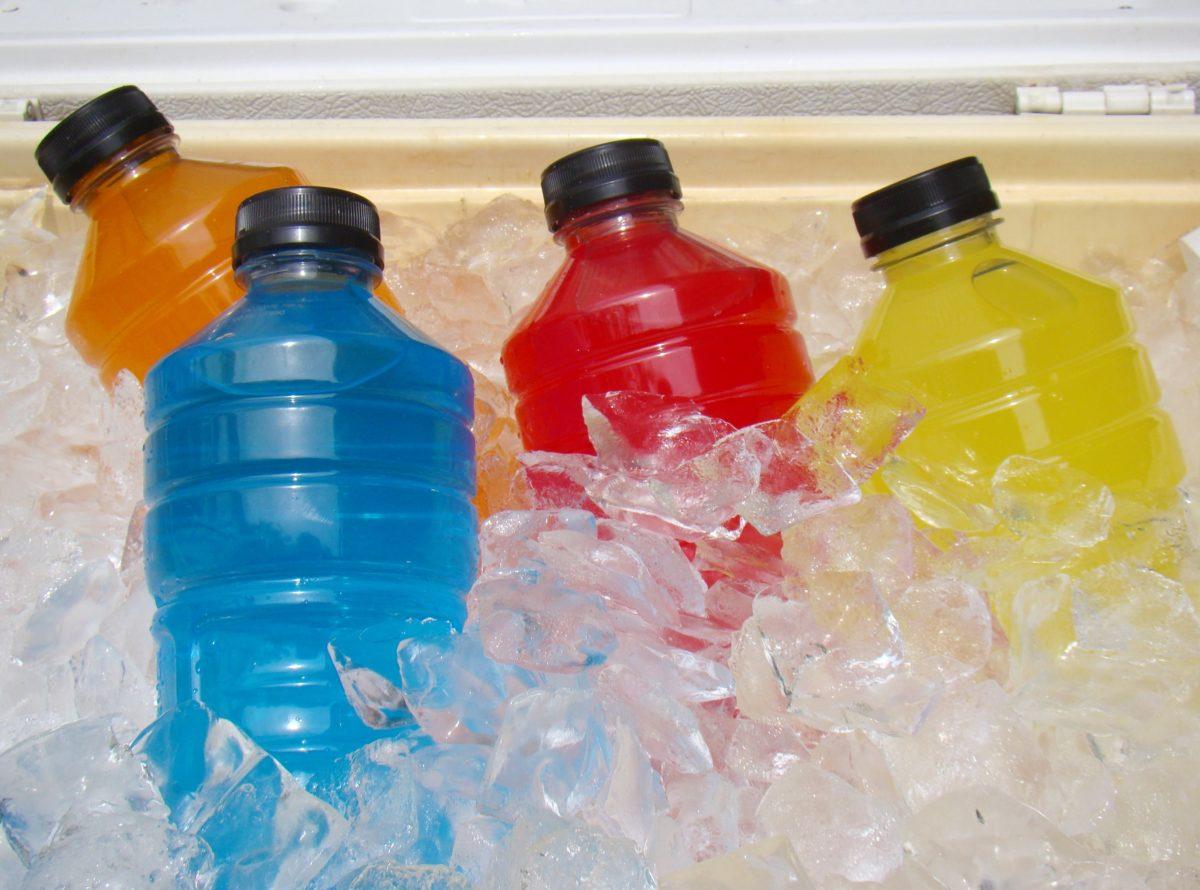
Sports drinks.[/caption]
Sports drinks work by:
- Replacing the fluids and minerals that you lose through sweat. By replacing fluids and electrolytes in a ratio that corresponds to sweat losses and improves absorption, sports drinks can help keep you from becoming dehydrated.
- Supplying energy with carbs. If you lack enough carbs during exercise, your blood sugar can drop. This can cause hypoglycemia, or low blood sugar, which can make you feel weak, confused, irritable, hungry, and decrease your performance.
- Improving stamina and recuperation. Other chemicals in some sports drinks may further improve your endurance and speed up your recovery. Caffeine, for instance, has been shown to boost a person's alertness, focus, drive, and pain tolerance while working out by stimulating the central nervous system. Vitamins help your immune system and stop the inflammation and oxidative damage that exercise causes. Antioxidants protect your cells from damage caused by oxidative stress and ease muscle pain. Muscle protein synthesis can be boosted and muscle breakdown prevented with the use of amino acids.
What to Look for in a Sports Drink?
Before we dive into the best sports drinks rankings, let's first look at what makes a good sports drink. A quality sports drink should have the following features:
- Electrolytes: It is important to replace electrolytes that are lost during exercise to avoid dehydration and muscle cramps. Electrolytes that are particularly crucial to check for include sodium, potassium, calcium, magnesium, and chloride.
- Carbohydrates: These help you get through your workouts and speed up the recovery process afterwards. The simple sugars glucose, fructose, and sucrose should be on your drink shopping list.
- Protein: Protein aids in muscle recovery and growth after strenuous exercise. Choose from beverages that include whey protein isolate, casein protein, or other sources of plant-based protein.
- Vitamins and minerals: Taking extra B vitamins, vitamin C, and iron, among other nutrients, has been shown to improve immune function and overall health.
What are the different types of sports drinks?
Sports drinks can be classified into three main categories based on their carbohydrate concentration: isotonic, hypotonic, and hypertonic.
- Isotonic sports drinks have about 6-8% carbohydrate content, which is about the same as the amount of fluids in your blood (plasma). Most types of activity that take more than an hour, have moderate to high intensity, or cause significant sweating call for the consumption of isotonic sports drinks. They are energizing and refreshing without making you feel bloated.
[caption id="attachment_10674" align="aligncenter" width="300"]

Isotonic sports drinks[/caption]
- Hypotonic sports drinks contain less than 6% carbs, which is less than the amount of fluid in your blood. When hydration is more vital than energy, or when your workout is of a lower intensity or shorter length, a hypotonic sports drink is the way to go. They're more hydrating than isotonic drinks, but not as energizing.
[caption id="attachment_10675" align="aligncenter" width="300"]

Hypotonic sports drinks[/caption]
- Hypertonic sports drinks have a carbohydrate concentration of more than 8%, which is more than the percentage of fluids in your blood. You should take a hypertonic sports drink when you need to replenish your energy levels more than your body needs water. In comparison to isotonic drinks, they are more energizing but less refreshing.
[caption id="" align="aligncenter" width="482"]
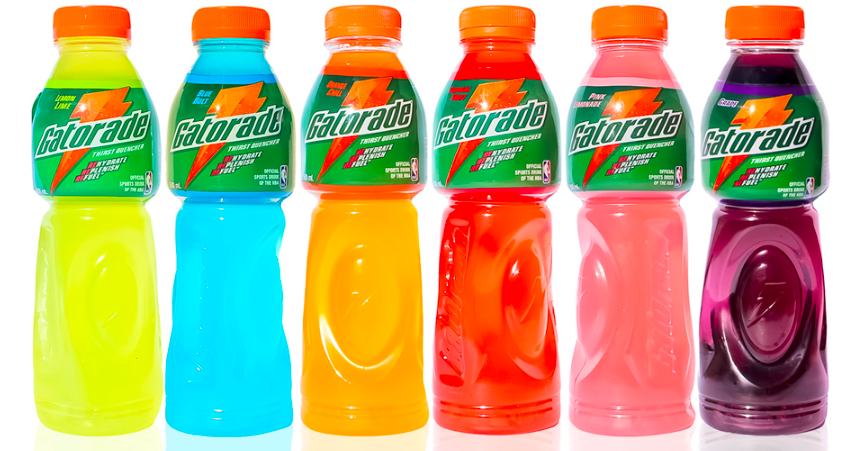
Gatorade's Hypertonic sports drink. Credit: Justrunlah.com[/caption]
https://youtu.be/uodVFLUaQBY?si=yUPAuS8ejEC0Kjb1
What are some of the best sports drinks of 2023?
Based on our research and evaluation, here are some of the best sports drinks of 2023 that you can try:
Best for Athletes: Gatorade Zero
[caption id="" align="aligncenter" width="523"]
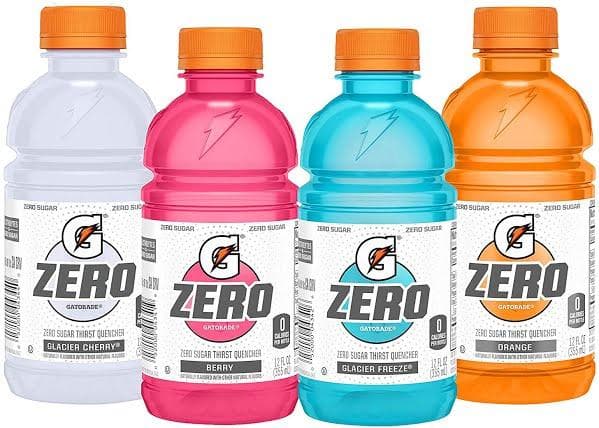
Gatorade Zero. | Credit: Walmart.com[/caption]
For athletes, we recommend
Gatorade Zero, a sugar-free variant of the original Gatorade that still contains electrolytes for hydration but no extra calories or carbs. There are zero calories, zero sugar, 100 milligrams of sodium, 30 milligrams of potassium, and 2 percent of the daily value for calcium in a 12-ounce container of Gatorade Zero, an isotonic sports drink. Natural fruit tastes including orange, lemon-lime, glacier cherry, glacier freeze, berry, etc. are also included.
Best for Recovery: BodyArmor Lyte Sports Drink
[caption id="" align="aligncenter" width="373"]
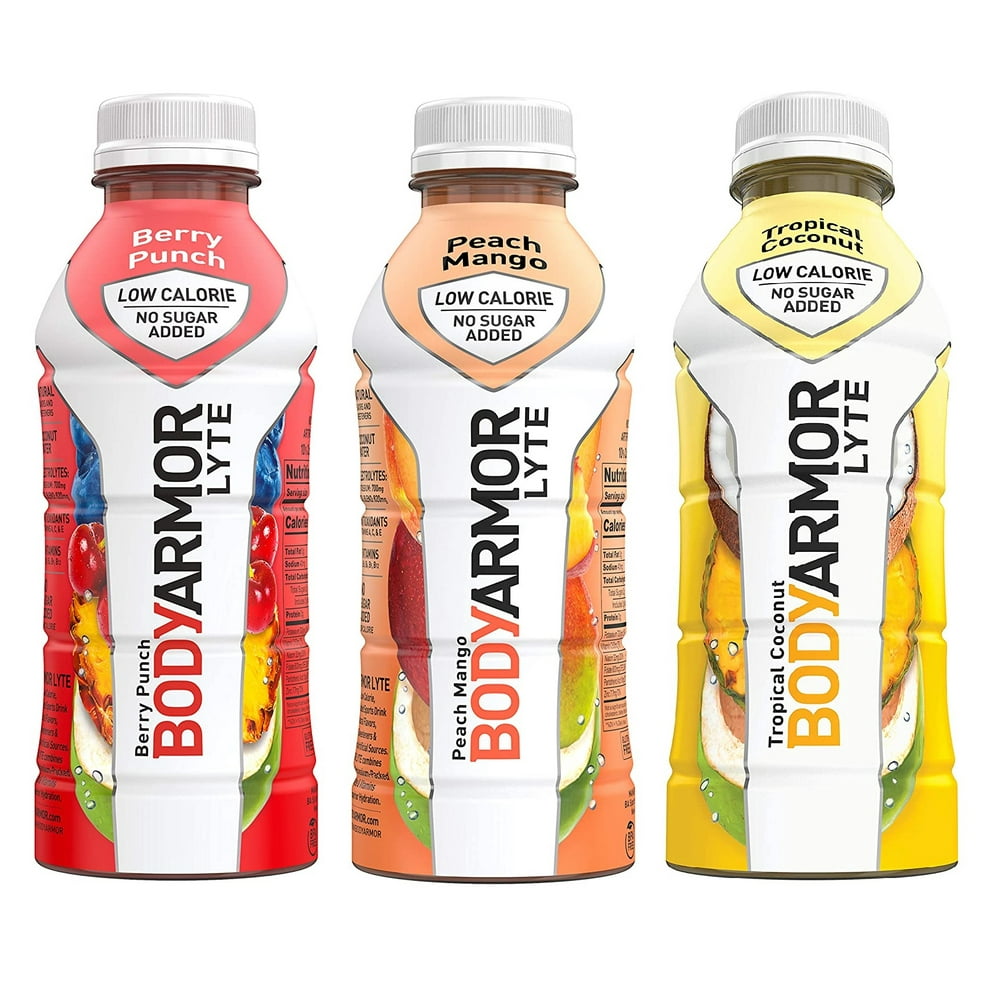
BODYARMOR LYTE Sports Drink Variety Pack. | Credit: Walmart.com[/caption]
As a low-calorie, high-potassium, and antioxidant-rich sports drink,
BodyArmor Lyte Sports Drink is our top pick for the best sports drink for recovery. It can help you replenish your fluids, electrolytes, and minerals after exercise. The 16 oz. container of BodyArmor Lyte contains 20 calories, 3 grams of sugar, 700 milligrams of potassium, 15 milligrams of sodium, and full amounts of the daily value for vitamins A, C, and E.
In addition, it contains natural flavors and sweeteners derived from fruits and vegetables, such as mango peach, blueberry pomegranate, and coconut. When water and nutrition are more crucial than energy, BodyArmor Lyte is the way to go.
Best Natural: Roar Organic Electrolyte Infusions
[caption id="" align="aligncenter" width="474"]

Roar Organic Electrolyte Infusions. | Credit: Sarahscoop.com[/caption]
We recommend
Roar Organic Electrolyte Infusions as the best natural sports drink because it is manufactured with real food, has zero added sugar, and contains natural electrolytes from sources like coconut water and sea salt. With 25 calories, 5 grams of sugar, 180 milligrams of potassium, 55 milligrams of sodium, and one hundred percent of the daily value for vitamins B3, B5, B6, and B12 in every 18-ounce bottle, Roar Organic is a hypotonic sports drink with many positive attributes.
It also contains organic fruit flavors and sweeteners, including cucumber watermelon, mango clementine, pineapple mint, etc. When hydration and natural ingredients are more vital than energy, Roar Organic is the better choice.
Best Low-Sugar: Powerade Zero
[caption id="" align="aligncenter" width="335"]
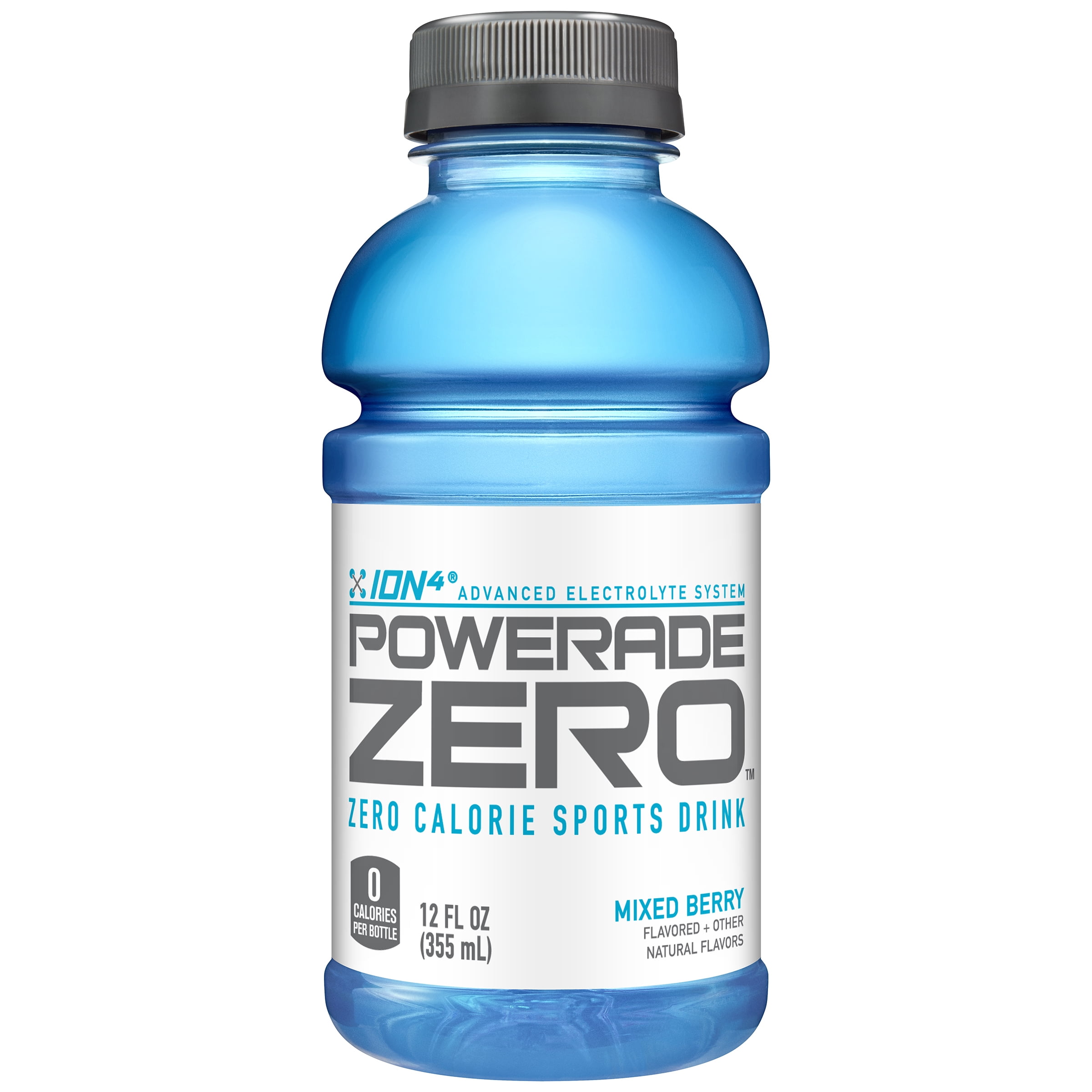
Powerade Zero. | Credit: Walmart.com[/caption]
To stay hydrated and perform at your best, you need electrolytes and vitamins, but you don't need extra calories or carbs, which is why Powerade Zero is our top pick for the best low-sugar sports drink. There are zero calories, zero sugar, 150 milligrams of sodium, 35 milligrams of potassium, and 10 percent of the daily value for vitamins B3, B6, and B12 in a 12-ounce container of Powerade Zero, an isotonic sports drink.
Various fruit flavors, like fruit punch, grape, mixed berry, etc., are included as well. Powerade Zero is great for high-intensity or long-term workouts, or when you need energy and vitamins more than water.
Best Budget: Propel Water
[caption id="" align="aligncenter" width="549"]

Propel Water[/caption]
If you are looking for a low-cost, low-calorie, vitamin-rich sports drink that won't break the bank, then go no further than
Propel Water, our top recommendation for the best budget sports drink. There are 10 calories, 2 grams of sugar, 160 milligrams of sodium, 45 milligrams of potassium, and 30% of the daily value for vitamins C, E, B3, B5, B6, and B12 in a 20-ounce container of Propel Water, making it a hypotonic sports drink.
There are also natural fruit flavors like berry, grape, kiwi strawberry, etc. The benefits of hydration and vitamins over energy make Propel Water a good choice for low-intensity or short-duration activity.
Best Overall: Nooma Organic Sports Drink
[caption id="" align="aligncenter" width="501"]

NOOMA Organic Electrolyte Sports Drink. | Credit: Walmart.com[/caption]
Nooma Organic Sports Drink is our top option because it contains natural electrolytes from coconut water, is low in sugar, and is created entirely from organic ingredients. Each 16-ounce container of Nooma, a hypotonic sports drink, contains 30 calories, 5 grams of sugar, 330 milligrams of potassium, 120 milligrams of sodium, and 30 milligrams of magnesium.
It also features natural fruit and herb flavors like blueberry peach, lemonade, mango, chocolate mint, and many more.
DIY Sports Drinks: Homemade Options
If you are looking for some homemade sports drink recipes that use natural ingredients, you are not alone. To eliminate the artificial colors, flavors, sweeteners, and preservatives frequently included in commercial sports drinks, many consumers opt to make their own at home. Also, making your own sports drink at home can save you money.
But how can you create a homemade sports drink that is just as effective as the commercial varieties? Water, carbs, and electrolytes are the components of every good sports drink. Electrolytes are minerals that help control fluid balance, muscular contraction, neuron function, and pH levels, while water is necessary for hydration and carbohydrates are the primary fuel for your muscles and brain during exercise.
Natural Ingredients for Homemade Sports Drinks
A. Fresh fruit juice (e.g., orange, grapefruit, apple)
B. Honey or maple syrup (for carbohydrates)
C. Coconut water (for electrolytes and hydration)
D. Herbs and spices (e.g., ginger, turmeric, cinnamon)
E. Electrolyte supplements (optional)
You may make your own sports drink by combining water with sugar (like honey, maple syrup, agave nectar, or fruit juice) and salt (like sea salt, table salt, or Himalayan salt). Carbohydrates come from the sugar, sodium from the salt, and hydration from the water. You can also add things like lemon or lime juice (for vitamin C and acidity), coconut water (for potassium and magnesium), calcium-magnesium powder (for calcium and magnesium), cayenne pepper (for capsaicin and heat), or fresh herbs or fruits (for antioxidants and taste).
Here are some recipes for DIY sports drinks that you can try as is or tweak to your liking:
- Lemon-Honey Sports Drink: Mix 1/4 cup of lemon juice, 1/4 cup of honey, 1/4 teaspoon of salt, and 4 cups of water. This drink provides about 25 grams of carbohydrates, 150 mg of sodium, and 10 mg of potassium per cup.
- Coconut Water Sports Drink: Mix 2 cups of coconut water, 2 cups of water, 2 tablespoons of lime juice, 2 tablespoons of maple syrup, and a pinch of salt. This drink provides about 15 grams of carbohydrates, 250 mg of sodium, and 600 mg of potassium per cup.
- Berry-Mint Sports Drink: Blend 1 cup of fresh or frozen berries (such as strawberries, raspberries, blueberries, or blackberries), 4 cups of water, 1/4 cup of honey, a handful of fresh mint leaves, and a pinch of salt. Strain the mixture if desired. This drink provides about 20 grams of carbohydrates, 150 mg of sodium, and 40 mg of potassium per cup.
Ultimately, to use sports drinks effectively to optimize your hydration and recovery, you should drink water before exercise; drink sports drinks during exercise; and drink sports drinks after exercise.
 Sports drinks.[/caption]
Sports drinks work by:
Sports drinks.[/caption]
Sports drinks work by:
 Isotonic sports drinks[/caption]
Isotonic sports drinks[/caption]
 Hypotonic sports drinks[/caption]
Hypotonic sports drinks[/caption]
 Gatorade's Hypertonic sports drink. Credit: Justrunlah.com[/caption]
https://youtu.be/uodVFLUaQBY?si=yUPAuS8ejEC0Kjb1
Gatorade's Hypertonic sports drink. Credit: Justrunlah.com[/caption]
https://youtu.be/uodVFLUaQBY?si=yUPAuS8ejEC0Kjb1
 Gatorade Zero. | Credit: Walmart.com[/caption]
For athletes, we recommend Gatorade Zero, a sugar-free variant of the original Gatorade that still contains electrolytes for hydration but no extra calories or carbs. There are zero calories, zero sugar, 100 milligrams of sodium, 30 milligrams of potassium, and 2 percent of the daily value for calcium in a 12-ounce container of Gatorade Zero, an isotonic sports drink. Natural fruit tastes including orange, lemon-lime, glacier cherry, glacier freeze, berry, etc. are also included.
Gatorade Zero. | Credit: Walmart.com[/caption]
For athletes, we recommend Gatorade Zero, a sugar-free variant of the original Gatorade that still contains electrolytes for hydration but no extra calories or carbs. There are zero calories, zero sugar, 100 milligrams of sodium, 30 milligrams of potassium, and 2 percent of the daily value for calcium in a 12-ounce container of Gatorade Zero, an isotonic sports drink. Natural fruit tastes including orange, lemon-lime, glacier cherry, glacier freeze, berry, etc. are also included.
 BODYARMOR LYTE Sports Drink Variety Pack. | Credit: Walmart.com[/caption]
As a low-calorie, high-potassium, and antioxidant-rich sports drink, BodyArmor Lyte Sports Drink is our top pick for the best sports drink for recovery. It can help you replenish your fluids, electrolytes, and minerals after exercise. The 16 oz. container of BodyArmor Lyte contains 20 calories, 3 grams of sugar, 700 milligrams of potassium, 15 milligrams of sodium, and full amounts of the daily value for vitamins A, C, and E.
In addition, it contains natural flavors and sweeteners derived from fruits and vegetables, such as mango peach, blueberry pomegranate, and coconut. When water and nutrition are more crucial than energy, BodyArmor Lyte is the way to go.
BODYARMOR LYTE Sports Drink Variety Pack. | Credit: Walmart.com[/caption]
As a low-calorie, high-potassium, and antioxidant-rich sports drink, BodyArmor Lyte Sports Drink is our top pick for the best sports drink for recovery. It can help you replenish your fluids, electrolytes, and minerals after exercise. The 16 oz. container of BodyArmor Lyte contains 20 calories, 3 grams of sugar, 700 milligrams of potassium, 15 milligrams of sodium, and full amounts of the daily value for vitamins A, C, and E.
In addition, it contains natural flavors and sweeteners derived from fruits and vegetables, such as mango peach, blueberry pomegranate, and coconut. When water and nutrition are more crucial than energy, BodyArmor Lyte is the way to go.
 Powerade Zero. | Credit: Walmart.com[/caption]
To stay hydrated and perform at your best, you need electrolytes and vitamins, but you don't need extra calories or carbs, which is why Powerade Zero is our top pick for the best low-sugar sports drink. There are zero calories, zero sugar, 150 milligrams of sodium, 35 milligrams of potassium, and 10 percent of the daily value for vitamins B3, B6, and B12 in a 12-ounce container of Powerade Zero, an isotonic sports drink.
Various fruit flavors, like fruit punch, grape, mixed berry, etc., are included as well. Powerade Zero is great for high-intensity or long-term workouts, or when you need energy and vitamins more than water.
Powerade Zero. | Credit: Walmart.com[/caption]
To stay hydrated and perform at your best, you need electrolytes and vitamins, but you don't need extra calories or carbs, which is why Powerade Zero is our top pick for the best low-sugar sports drink. There are zero calories, zero sugar, 150 milligrams of sodium, 35 milligrams of potassium, and 10 percent of the daily value for vitamins B3, B6, and B12 in a 12-ounce container of Powerade Zero, an isotonic sports drink.
Various fruit flavors, like fruit punch, grape, mixed berry, etc., are included as well. Powerade Zero is great for high-intensity or long-term workouts, or when you need energy and vitamins more than water.
 NOOMA Organic Electrolyte Sports Drink. | Credit: Walmart.com[/caption]
Nooma Organic Sports Drink is our top option because it contains natural electrolytes from coconut water, is low in sugar, and is created entirely from organic ingredients. Each 16-ounce container of Nooma, a hypotonic sports drink, contains 30 calories, 5 grams of sugar, 330 milligrams of potassium, 120 milligrams of sodium, and 30 milligrams of magnesium.
It also features natural fruit and herb flavors like blueberry peach, lemonade, mango, chocolate mint, and many more.
NOOMA Organic Electrolyte Sports Drink. | Credit: Walmart.com[/caption]
Nooma Organic Sports Drink is our top option because it contains natural electrolytes from coconut water, is low in sugar, and is created entirely from organic ingredients. Each 16-ounce container of Nooma, a hypotonic sports drink, contains 30 calories, 5 grams of sugar, 330 milligrams of potassium, 120 milligrams of sodium, and 30 milligrams of magnesium.
It also features natural fruit and herb flavors like blueberry peach, lemonade, mango, chocolate mint, and many more.



















